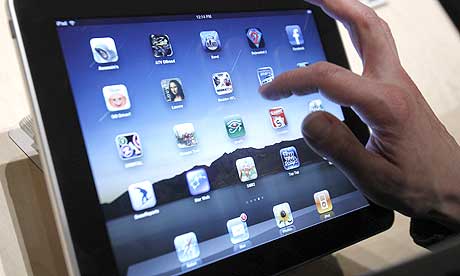
When it was announced, to much fanfare and the sort of near- hysterical hype that has come to characterise the Mac fan club, the iPad was seen by many technology watchers as an answer in search of a question. A sort of hybrid between a mobile phone and the new generation of small laptops, or netbooks, which would appeal only to early adopters.
But for media executives grappling with the painful transition from the lucrative analogue world to digital platforms, the iPad – and the host of imitators it is certain to spawn once it hits US shops this week – represents an opportunity to create interactive content that could generate new revenues, either from consumers or advertisers. For some, the iPad potentially offers the best chance they have had to wrest some extra cash out of a digital audience for over a decade.
It has not all been plain sailing, however. The dreams of Steve Jobs, the chief executive of Apple, that the iPad would have exclusive TV content available under subscription seem to be fading, while the world's largest book publisher, Random House, last week suggested that it may not put its titles on the iPad's digital shelves because of the potential for sparking an e-book price war, further depressing its profits.
Those shelves themselves have come in for some criticism with one senior publishing figure complaining to MediaGuardian: "on the screen it looks like your books are stored on a cruddy piece of IKEA furniture. I thought: I don't want my books on that. My bookcase at home looks much better than that. Hopefully that will change when the iPad comes out". Some newspaper publishers, meanwhile, have expressed dismay at Apple's refusal to support Flash, which is widely used in their video clips and online adverts. Apple is being lobbied very hard to drop its objection to the competing video standard.
But five of the six largest book publishers – Macmillan, Simon & Schuster, Hachette, HarperCollins and Penguin – are planning to make e-books available on the device; while content providers, including the New York Times, Wall Street Journal and Time magazine, will appear either at or shortly after launch.
"What people have been struggling with until now is the form factor," explains Genevieve Shore, the director of digital strategy at Pearson, the owner of the Financial Times. "We expect that the iPad and other new devices will make the user experience far more interactive."
Early iPad criticism claimed it is just another way for consumers to access existing websites. But designers are hoping to be able to create new forms of digital content that will not be available on the general web, not least because the iPad brings with it the ability to deliver content through downloadable – and, crucially, chargeable – applications. The fact that Apple has the details of more than 125m credit cards on its iTunes store has not gone unnoticed.
The man charged with building Rupert Murdoch's paywalls, News Corp's chief digital officer, Jonathan Miller, reckons the iPad is an "inflexion point". "Apple is deliberately, in my view, creating a media consumption device … It is not a computer, it does not have a USB port – it may do later – it does not have a camera – it may do later – and it does not multi-task, which computers do. It is designed for consuming media, one at a time. it is not a communications device, it is a media consumption device. We have not seen that before, so it is a seminal moment in the evolution of internet-based media consumption."
He adds: "There is the ability to show that you are producing not only great content but a great overall experience which can support a paid-for model. There is a moment in which you have the chance to set that expectation and explain that there is a cost to doing it while showing that you are delivering value."
But the iPad is not just about getting cash off consumers. As a hybrid stuck somewhere between the "sit-forward" experience of the PC and mobile phone-based internet and the "sit back" experience of TV viewing and newspaper reading, the iPad will try to grab some of the money advertisers spend on display-based brand-building campaigns. It is not just the more traditional paper-based media firms that are looking to the iPad to expand their portfolios. CBS Interactive Music Group, the home to Last.fm and a host of radio stations, is also working on iPad versions of its applications.
Ben Wood, an analyst at the mobile device specialists CCS Insights, reckons the iPad is "a potential breakthrough product that will accelerate the transition from analogue to digital distribution of content". Many media companies hope it will also provide a welcome boost for their bottom lines.

